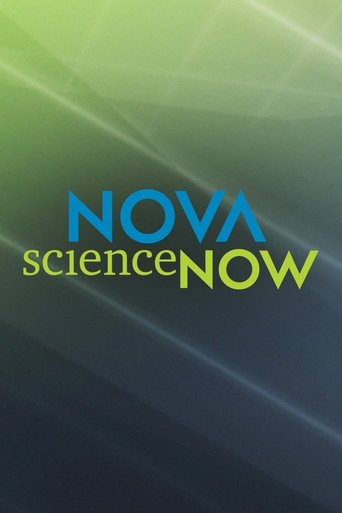
NOVA scienceNOW (2005)
NOVA scienceNOW is a News magazine version of the long-running and venerable PBS science program Nova. Premiering on January 25, 2005, the series was originally hosted by Robert Krulwich, who described it as an experiment in coverage of "breaking science, science that's right out of the lab, science that sometimes bumps up against politics, art, culture". At the beginning of season two, Neil deGrasse Tyson replaced Krulwich as the show's host. Tyson announced he would leave the show and was replaced by David Pogue beginning season 6.
-

Episode 1 - Dark Matter, Mice, Crowd Wisdom
Release Date: 2008-06-25Dark Matter - Turns out most of the universe is held together by a mysterious, invisible substance. Of Mice and Memory - Mice placed in enriched environments can recover lost memories, giving hope to those who study Alzheimer's. Profile: Hany Farid - This self-proclaimed "accidental scientist" is a digital detective inventing new ways to tell if photos have been faked. Wisdom of the Crowds - Ask enough people to estimate something, and their combined guesses will get you surprisingly close to the right answer.
-

Episode 2 - Personal Genome; Digital Art Authentication; Carbon Sequestration; Pardis Sabeti Profile
Release Date: 2008-07-02Personal DNA Testing - Genetic testing to assess risk factors for a handful of serious illnesses is now commercially available. But is it a good idea? Art Authentication - See how clever computer algorithms can distinguish a master fake from a masterpiece. Capturing Carbon - An eighth-grader's science fair project prompts her scientist father to develop a new way to pull excess carbon dioxide out of the atmosphere. Profile: Pardis Sabeti - By night she's a rocker. By day, she's a Harvard geneticist tracking the evolution of the human genome.
-

Episode 3 - Saving Hubble, First Primates, Iraqibacter
Release Date: 2008-07-09Saving Hubble - Two teams of spacewalkers take on the risky mission of reviving the ailing Space Telescope. First Primates - Our most distant primate ancestors, which lived about 55 million years ago, were tree-dwellers the size of mice. Profile: Alfredo Quiñones-Hinojosa - He jumped the fence from Mexico to work as a farmhand and ended up a leading brain surgeon. Killer Microbe - A relatively benign bug becomes a highly lethal pathogen, known to U.S. soldiers as Iraqibacter.
-

Episode 4 - Bird Brains, Space Storms, Smart Bridges
Release Date: 2008-07-16Bird Brains - Clues to the origins of human language are turning up in the brains of birds. Space Storms - Behind the dazzling display of the aurora borealis are space storms that could turn the lights off here on Earth. Profile: Yoky Matsuoka - A former tennis prodigy aims to create advanced prosthetic limbs controlled by human thought. Smart Bridges - Can we engineer bridges that tell us what's wrong with them before it's too late?
-

Episode 5 - Leeches; SETI; Stem Cells; Edith Widder
Release Date: 2008-07-23Leeches - A century after falling out of favor, medicinal leeches are back in hospitals, sucking away on patients' wounds. SETI - Astronomers have their radio telescopes tuned to receive signals from alien worlds. But is anybody out there? Stem Cells Breakthrough - Three separate teams overcome a biomedical hurdle—creating stem cells without the use of human embryos. Profile: Edith Widder - Meet a marine biologist and explorer who has engineered new ways to spy on deep-sea creatures.
-

Episode 6 - Phoenix; Mammoth Mystery; Judah Folkman Tribute
Release Date: 2008-07-30Phoenix Mars Lander - NASA's latest robot has already found frozen water and is looking for more signs that the Red Planet could support life. Brain Trauma - Even so-called "mild" head injuries turn out to be anything but. Mammoth Mystery - A pair of mammoth skeletons is found locked together by their tusks. What happened? Profile: Judah Folkman - Once scorned for his ideas about how cancer grows, the late Judah Folkman is now hailed as a visionary.
-

Episode 7 - Aging, Space Elevator, Maya from Space
Release Date: 2008-08-06Aging - Will research into "longevity genes" help us live longer and healthier lives? Space Elevator - Can we build a 22,000-mile-high cable to transport cargo and people into space? Maya - NASA archeologists use satellites to pinpoint ancient ruins buried deep in the jungle. Profile: Bonnie Bassler - Her insight into how bacteria "talk" has launched a revolution in biological and medical research.
-

Episode 8 - Mass Extinction, 1918 Flu, Papyrus
Release Date: 2008-08-13Mass Extinction - What caused the mother of all extinctions 250 million years ago? 1918 Flu - A virus that killed up to 50 million people is brought back to life to decipher its deadliness. Profile: Cynthia Breazeal - A daring engineer designs robots to communicate and interact the way people do. Papyrus - Scraps of writings from a garbage dump in ancient Egypt reveal what life was like 2,000 years ago.
-

Episode 9 - Asteroid, Island of Stability, Karl Iagnemma
Release Date: 2008-08-20Asteroid - Will a doomsday rock the size of the Rose Bowl hit Earth in 2036? Island of Stability - Follow the decades-long quest to create the elusive element 114. Obesity - Examine the biology behind the compulsion to eat. Profile: Karl Iagnemma - An innovative MIT roboticist is also an acclaimed fiction writer.
-

Episode 10 - T-Rex Blood, Epigenetics, Kryptos
Release Date: 2008-08-20T-Rex Blood? - Preserved soft tissue, including possible blood vessels and red blood cells, are turning up in dinosaur fossils. Epigenetics - Our lifestyles can change the way our genes are expressed, leading even identical twins to become distinct as they age. Kryptos - A coded sculpture at CIA headquarters has yet to be fully broken. Profile: Arlie Petters - A boy from a rural village in Belize grows up to become a world-class mathematician and cosmologist.
